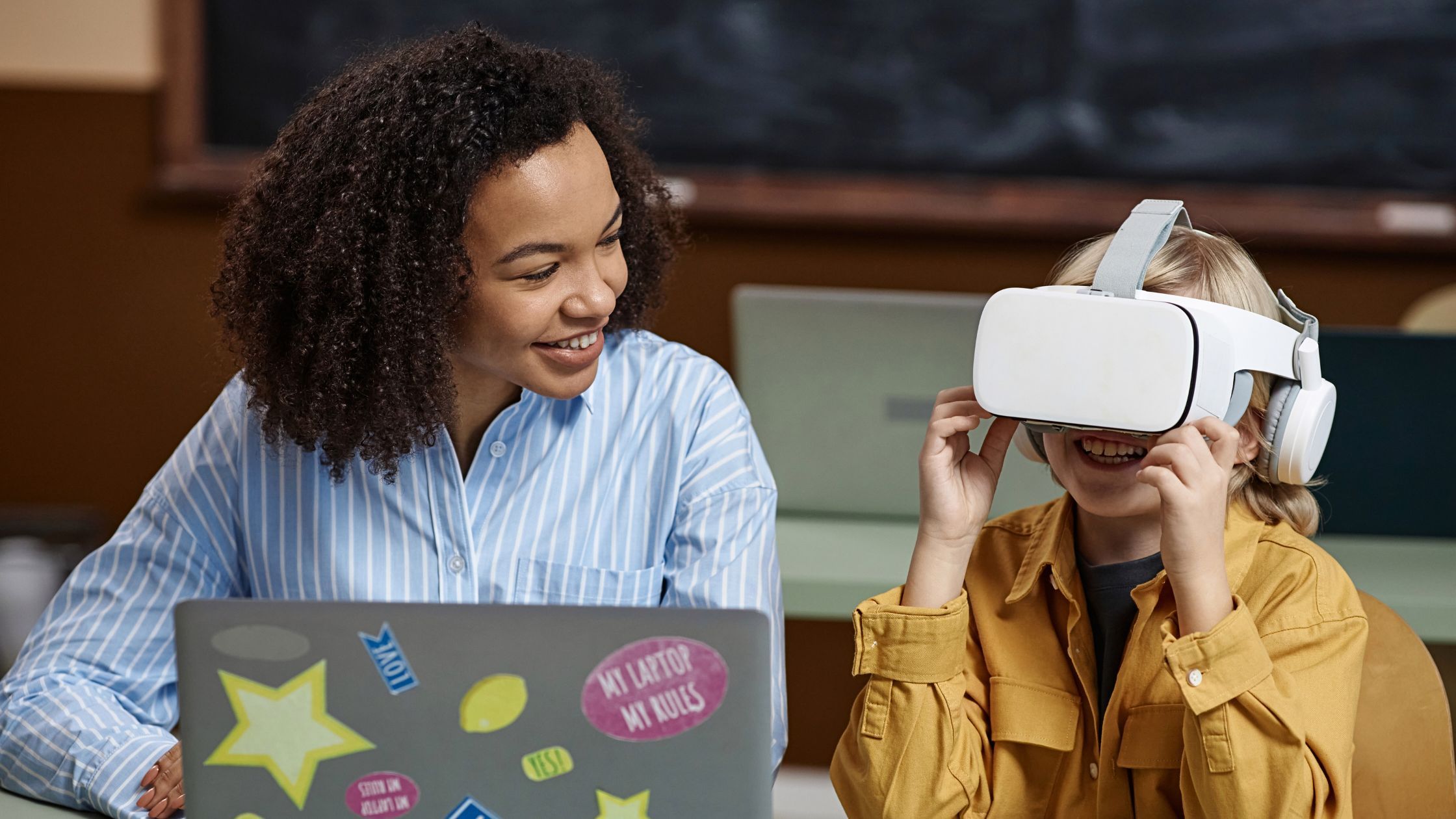April'25
The world of education is evolving faster than ever, with technology leading the charge. From AI-powered tutors to immersive virtual classrooms, the next five years promise groundbreaking innovations that will transform how we learn and teach.
Whether you're a teacher, parent or student, staying updated on these trends will help you make the most of digital education. These advancements will make learning more personalized, engaging, and accessible than ever before.
Let’s dive into the most exciting EdTech trends set to dominate the next half-decade—and how they’ll impact learners everywhere!
1. AI & Adaptive Learning: Your Child’s 24/7 Tutor
Artificial Intelligence (AI) is no longer science fiction—it’s revolutionizing education. In the next five years, AI-powered platforms will analyze a student’s strengths and weaknesses in real time, adjusting lessons to fit their unique learning pace.
-
Smart Tutoring Systems – Imagine an online teaching platform that detects when a child struggles with fractions and instantly provides extra practice—without frustration.
-
Automated Grading & Feedback – AI will handle routine assessments, allowing teachers to spend more time mentoring and engaging with students.
-
Personalized Learning Paths – No more one-size-fits-all education! AI will tailor lessons based on students’ interests, from coding to creative writing.
2. Immersive Learning: VR & AR Take Over Classrooms
Forget boring textbooks—soon, students will step inside their lessons with Augmented Reality (AR) and Virtual Reality (VR). These technologies will turn abstract concepts into hands-on experiences:
-
Virtual Field Trips – Walk through ancient Rome, dive into the human bloodstream, or explore Mars—all from home.
-
Interactive Science Labs – Conduct chemistry experiments in VR—no mess, no safety risks, just pure learning fun.
-
AR-Enhanced Textbooks – Point a phone at a page, and 3D models pop up, making complex topics (like geometry or anatomy) easier to grasp.
Online teachers will use these tools to make lessons unforgettable, whether through a VR rollercoaster to explain physics or an AR theater bringing Shakespeare’s plays to life!
3. Gamification: Learning That Feels Like Play
Kids already love games—so why not make education just as engaging? Gamified learning incorporates rewards, challenges, and storytelling to boost motivation and comprehension.
-
Leaderboards & Badges – Healthy competition encourages students to excel.
-
Educational E-sports – Math battles, vocabulary duels, and science quests turn studying into an interactive experience.
-
Story-Driven Learning – Instead of memorizing facts, kids solve mysteries, build civilizations, or code their own games.
This approach keeps students excited and engaged while reinforcing learning in a fun and interactive way.
4. The Rise of Microlearning & Skill-Based Education
Gone are the days of hour-long lectures. The future belongs to bite-sized learning—short, focused lessons that fit into busy schedules.
-
Short Explainer Videos – Perfect for quick, digestible learning bursts.
-
Skill-Specific Courses – Instead of semester-long classes, students master one skill at a time (e.g., Python coding, debate techniques, or digital art).
-
Immediate Help – Stuck on homework? AI-generated tutorials provide instant, targeted help.
Online teachers will curate these micro-lessons, ensuring students get exactly what they need, when they need it.
5. Global Classrooms: Learning Without Borders
The internet has removed geographical barriers, making education more inclusive than ever. By 2030, we’ll see:
-
Live Collaboration Across Continents – A student in Tokyo teams up with peers in Brazil for a group project.
-
Diverse Perspectives – Kids learn history, culture, and science from educators worldwide.
-
Language Learning with Native Speakers – AI-powered conversation partners and online teachers will make learning new languages easier and more immersive.
6. Blockchain & Digital Credentials: No More Lost Certificates
Paper diplomas will soon be a thing of the past. Blockchain technology, a secure and decentralized digital ledger system, will be used to verify and store achievements digitally, ensuring they are tamper-proof and easily accessible.
-
Lifetime Learning Portfolios – Every skill earned (coding, music, debate) gets stored in a tamper-proof digital record.
-
Micro-Credentials – Kids earn badges for mastering specific skills, making their resumes stand out.
-
Seamless School Transfers – Moving schools? Blockchain ensures academic records are updated instantly
This innovation will make credential verification effortless, benefiting both students and employers.
7. Emotional AI: Supporting Mental Health & Motivation
Education isn’t just about academics—it’s about well-being. Future EdTech solutions will focus on students’ emotional and mental health, incorporating:
-
Mood Detection – AI senses frustration or boredom and adjusts lessons accordingly.
-
Mindfulness & Stress Relief – Built-in meditation breaks, and encouragement features will keep students motivated.
-
Social-Emotional Learning (SEL) Tools – Interactive scenarios will help kids practice empathy, teamwork, and resilience.
By 2030, EdTech will not only teach, but also support students' emotional growth.
Ready to Jump into the Future of Education?
The classroom of 2030 will be smarter, more immersive, and more personalized than ever. Whether through AI tutors, VR field trips, or gamified lessons, your child’s learning journey is about to get a major upgrade.
For parents transitioning from Takelessons, Wondrfly offers the next step—exciting extracurricular programs that blend technology, creativity, and fun. From coding adventures to storytelling workshops, Wondrfly helps kids discover their passions while building future-ready skills.
Don’t wait for the future—start exploring today with Wondrfly!



